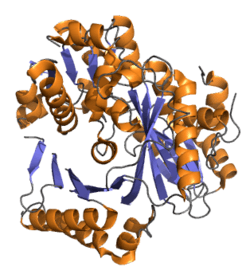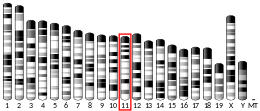ACACA
Acetyl-CoA carboxylase 1 also known as ACC-alpha or ACCa is an enzyme that in humans is encoded by the ACACA gene.[5][6]
Function
Acetyl-CoA carboxylase (ACC) is a complex multifunctional enzyme system. ACC is a biotin-containing enzyme which catalyzes the carboxylation of acetyl-CoA to malonyl-CoA, the rate-limiting step in fatty acid synthesis. There are two ACC forms, alpha and beta, encoded by two different genes. ACC-alpha is highly enriched in lipogenic tissues. The enzyme is under long term control at the transcriptional and translational levels and under short term regulation by the phosphorylation/dephosphorylation of targeted serine residues and by allosteric transformation by citrate or palmitoyl-CoA.[5]
References
- 1 2 3 ENSG00000275176 GRCh38: Ensembl release 89: ENSG00000278540, ENSG00000275176 - Ensembl, May 2017
- 1 2 3 GRCm38: Ensembl release 89: ENSMUSG00000020532 - Ensembl, May 2017
- ↑ "Human PubMed Reference:".
- ↑ "Mouse PubMed Reference:".
- 1 2 "Entrez Gene: acetyl-Coenzyme A carboxylase alpha".
- ↑ Abu-Elheiga L, Jayakumar A, Baldini A, Chirala SS, Wakil SJ (April 1995). "Human acetyl-CoA carboxylase: characterization, molecular cloning, and evidence for two isoforms". Proceedings of the National Academy of Sciences of the United States of America. 92 (9): 4011–5. doi:10.1073/pnas.92.9.4011. PMC 42092. PMID 7732023.
Further reading
- Sinilnikova OM, McKay JD, Tavtigian SV, Canzian F, DeSilva D, Biessy C, et al. (March 2007). "Haplotype-based analysis of common variation in the acetyl-coA carboxylase alpha gene and breast cancer risk: a case-control study nested within the European Prospective Investigation into Cancer and Nutrition". Cancer Epidemiology, Biomarkers & Prevention. 16 (3): 409–15. doi:10.1158/1055-9965.EPI-06-0617. PMID 17372234.
- Diaz FJ, Meary A, Arranz MJ, Ruaño G, Windemuth A, de Leon J (December 2009). "Acetyl-coenzyme A carboxylase alpha gene variations may be associated with the direct effects of some antipsychotics on triglyceride levels". Schizophrenia Research. 115 (2–3): 136–40. doi:10.1016/j.schres.2009.09.038. PMC 2784140. PMID 19846279.
- Yatscoff MA, Jaswal JS, Grant MR, Greenwood R, Lukat T, Beker DL, Rebeyka IM, Lopaschuk GD (December 2008). "Myocardial hypertrophy and the maturation of fatty acid oxidation in the newborn human heart". Pediatric Research. 64 (6): 643–7. doi:10.1203/PDR.0b013e318184d281. PMID 18614968.
- Law IK, Liu L, Xu A, Lam KS, Vanhoutte PM, Che CM, Leung PT, Wang Y (May 2009). "Identification and characterization of proteins interacting with SIRT1 and SIRT3: implications in the anti-aging and metabolic effects of sirtuins". Proteomics. 9 (9): 2444–56. doi:10.1002/pmic.200800738. PMID 19343720.
- Yoon S, Lee MY, Park SW, Moon JS, Koh YK, Ahn YH, Park BW, Kim KS (September 2007). "Up-regulation of acetyl-CoA carboxylase alpha and fatty acid synthase by human epidermal growth factor receptor 2 at the translational level in breast cancer cells". The Journal of Biological Chemistry. 282 (36): 26122–31. doi:10.1074/jbc.M702854200. PMID 17631500.
- de Leon J, Correa JC, Ruaño G, Windemuth A, Arranz MJ, Diaz FJ (January 2008). "Exploring genetic variations that may be associated with the direct effects of some antipsychotics on lipid levels". Schizophrenia Research. 98 (1–3): 40–6. doi:10.1016/j.schres.2007.10.003. PMID 18031993.
- Lee YK, Hwang JT, Lee MS, Kim YM, Park OJ (August 2009). "Kidney bean husk extracts exert antitumor effect by inducing apoptosis involving AMP-activated protein kinase signaling pathway". Annals of the New York Academy of Sciences. 1171: 484–8. doi:10.1111/j.1749-6632.2009.04697.x. PMID 19723093.
- Lee-Young RS, Koufogiannis G, Canny BJ, McConell GK (August 2008). "Acute exercise does not cause sustained elevations in AMPK signaling or expression". Medicine and Science in Sports and Exercise. 40 (8): 1490–4. doi:10.1249/MSS.0b013e318173a037. PMID 18614941.
- Lu Y, Dollé ME, Imholz S, van 't Slot R, Verschuren WM, Wijmenga C, Feskens EJ, Boer JM (December 2008). "Multiple genetic variants along candidate pathways influence plasma high-density lipoprotein cholesterol concentrations". Journal of Lipid Research. 49 (12): 2582–9. doi:10.1194/jlr.M800232-JLR200. PMID 18660489.
- Lim J, Hao T, Shaw C, Patel AJ, Szabó G, Rual JF, Fisk CJ, Li N, Smolyar A, Hill DE, Barabási AL, Vidal M, Zoghbi HY (May 2006). "A protein-protein interaction network for human inherited ataxias and disorders of Purkinje cell degeneration". Cell. 125 (4): 801–14. doi:10.1016/j.cell.2006.03.032. PMID 16713569.
- Scaglia N, Chisholm JW, Igal RA (2009). Bonini M, ed. "Inhibition of stearoylCoA desaturase-1 inactivates acetyl-CoA carboxylase and impairs proliferation in cancer cells: role of AMPK". PLoS One. 4 (8): e6812. doi:10.1371/journal.pone.0006812. PMC 2728543. PMID 19710915.
- Oshikawa M, Sugai Y, Usami R, Ohtoko K, Toyama S, Kato S (June 2008). "Fine expression profiling of full-length transcripts using a size-unbiased cDNA library prepared with the vector-capping method". DNA Research. 15 (3): 123–36. doi:10.1093/dnares/dsn010. PMC 2650634. PMID 18487259.
- Olsen JV, Blagoev B, Gnad F, Macek B, Kumar C, Mortensen P, Mann M (November 2006). "Global, in vivo, and site-specific phosphorylation dynamics in signaling networks". Cell. 127 (3): 635–48. doi:10.1016/j.cell.2006.09.026. PMID 17081983.
- Conde E, Suarez-Gauthier A, García-García E, Lopez-Rios F, Lopez-Encuentra A, García-Lujan R, Morente M, Sanchez-Verde L, Sanchez-Cespedes M (September 2007). "Specific pattern of LKB1 and phospho-acetyl-CoA carboxylase protein immunostaining in human normal tissues and lung carcinomas". Human Pathology. 38 (9): 1351–60. doi:10.1016/j.humpath.2007.01.022. PMID 17521700.
- Ray H, Suau F, Vincent A, Dalla Venezia N (January 2009). "Cell cycle regulation of the BRCA1/acetyl-CoA-carboxylase complex". Biochemical and Biophysical Research Communications. 378 (3): 615–9. doi:10.1016/j.bbrc.2008.11.090. PMID 19061860.
- Ma J, Yan R, Zu X, Cheng JM, Rao K, Liao DF, Cao D (February 2008). "Aldo-keto reductase family 1 B10 affects fatty acid synthesis by regulating the stability of acetyl-CoA carboxylase-alpha in breast cancer cells". The Journal of Biological Chemistry. 283 (6): 3418–23. doi:10.1074/jbc.M707650200. PMID 18056116.
- Locke GA, Cheng D, Witmer MR, Tamura JK, Haque T, Carney RF, Rendina AR, Marcinkeviciene J (July 2008). "Differential activation of recombinant human acetyl-CoA carboxylases 1 and 2 by citrate". Archives of Biochemistry and Biophysics. 475 (1): 72–9. doi:10.1016/j.abb.2008.04.011. PMID 18455495.
- Ruaño G, Bernene J, Windemuth A, Bower B, Wencker D, Seip RL, Kocherla M, Holford TR, Petit WA, Hanks S (February 2009). "Physiogenomic comparison of edema and BMI in patients receiving rosiglitazone or pioglitazone". Clinica Chimica Acta; International Journal of Clinical Chemistry. 400 (1–2): 48–55. doi:10.1016/j.cca.2008.10.009. PMID 18996102.
- Shen Y, Tong L (May 2008). "Structural evidence for direct interactions between the BRCT domains of human BRCA1 and a phospho-peptide from human ACC1". Biochemistry. 47 (21): 5767–73. doi:10.1021/bi800314m. PMC 2392887. PMID 18452305.
External links
- Human ACACA genome location and ACACA gene details page in the UCSC Genome Browser.
This article is issued from
Wikipedia.
The text is licensed under Creative Commons - Attribution - Sharealike.
Additional terms may apply for the media files.




